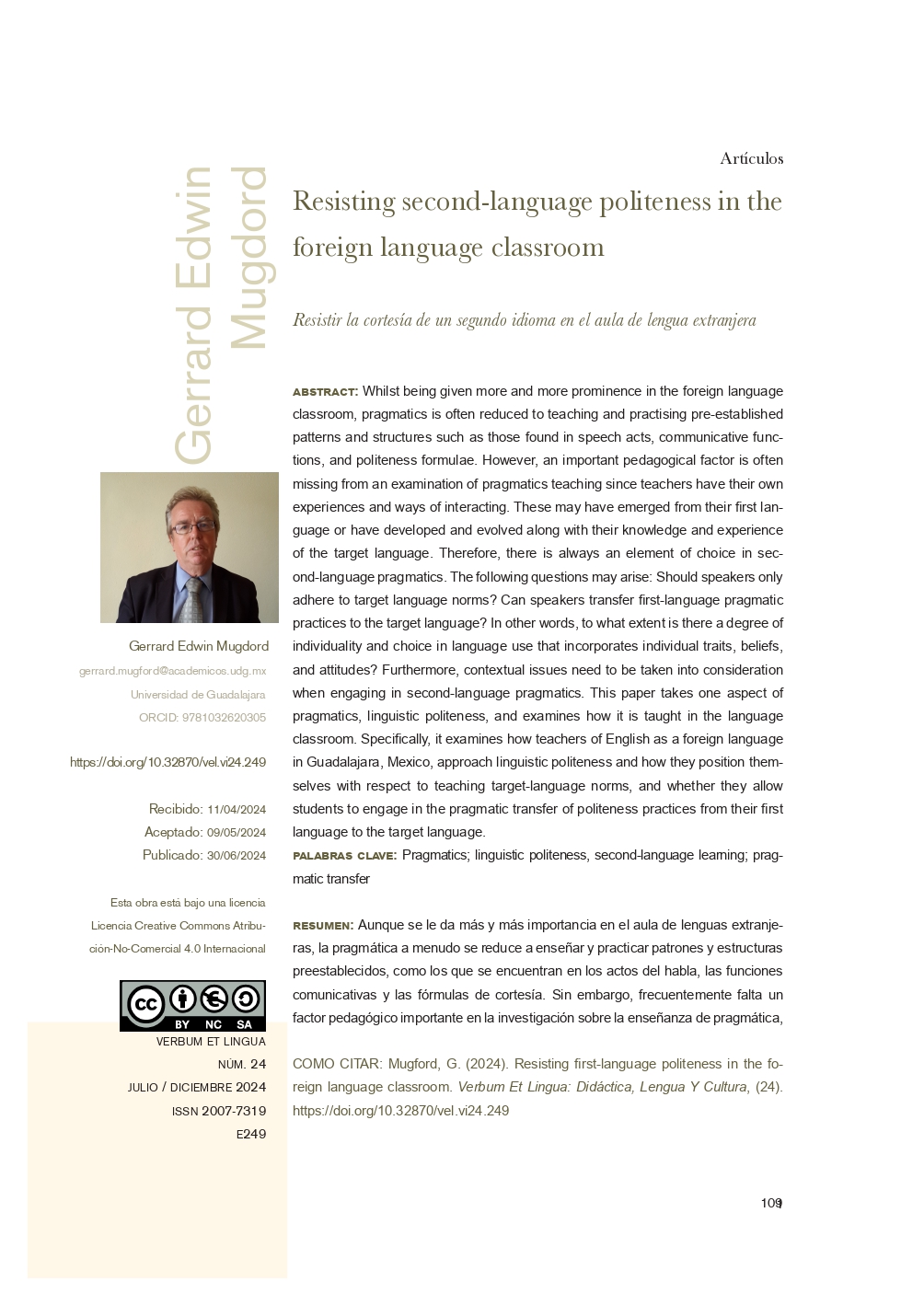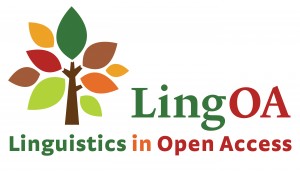Resisting second-langauge politeness in the foreign language classroom
DOI:
https://doi.org/10.32870/vel.vi24.274Parole chiave:
Pragmática, cortesía lingüística, aprendizaje de una segunda lengua, transferencia pragmáticaAbstract
Aunque se le da más y más importancia en el aula de lenguas extranjeras, la pragmática a menudo se reduce a enseñar y practicar patrones y estructuras preestablecidos, como los que se encuentran en los actos del habla, las funciones comunicativas y las fórmulas de cortesía. Sin embargo, frecuentemente falta un factor pedagógico importante en la investigación sobre la enseñanza de pragmática,
Downloads
Riferimenti bibliografici
Batziakas, Bill. 2016. Achieving Politeness in ELF Conversations: A Functional-Pragmatic Perspective. In: Natasha Tsantila, Jane Mandalios, and Melpomeni Ilkos, (Eds). ELF: Pedagogical and Interdisciplinary Perspectives. Athens: The American College of Greece Press, 220-226.
file:///C:/Users/gerry/Downloads/BatziakasB.2016.AchievingpolitenessinELFconversationsafunctional-pragmaticpe.pdf
Bardovi-Harlig, Kathleen. 1996. ‘Pragmatics and language teaching: bringing pragmatics and pedagogy together’ in Lawrence F. Bouton (ed.). Pragmatics and Language Learning. Monograph Series Volume 7. Urbana, IL: University of Illinois.
Berns, Margie. 2015. Pedagogy and world Englishes: The legacy of Yamuna Kachru. World Englishes, 2015, 34(1):22-30
Brown, Andrew, and Paul Dowling. 1998. Doing research / Reading research: A mode of interrogation for education. Falmer.
Canagarajah, Suresh. 1999. Resisting linguistic imperialism in English teaching. Oxford, UK: Oxford University Press.
Cohen, Andrew D. 2018. Learning pragmatics from native and nonnative language teachers. Bristol: Multilingual Matters.
Common European Framework of Reference for Languages: Learning, teaching, assessment (CEFR) 2001. Cambridge: Cambridge University Press.
Crandall, Elizabeth and Helen Basturkmen. 2004. Evaluating pragmatics-focused materials. ELT Journal 58/1: 38-49.
Escandell-Vidal, Victoria. 2018. The pragmatic toolbox. In Dumitrescu, Domnita and Patricia Lorena Andueza. (eds). L2 Spanish Pragmatics: From Research to Teaching. London/New York: Routledge, 15-32.
Félix-Brasdefer, J. César. 2008. Politeness in Mexico and the United States: A Contrastive Study of the Realization and Perception of Refusals. Amsterdam/Philadelphia: John Benjamins.
Feren?ík, Milan. 2014. Politeness Aspects Of Elf Interaction: A Discussion Of A Conversational Encounter From The Voice Corpus. Prague Journal of English Studies, vol.1, no.1, 3914, 109-132
file:///C:/Users/gerry/Downloads/10.2478_pjes-2014-0006.pdf
Filmore, Charles. 1981. Ideal readers and real readers. In Tannen, Deborah (ed.), Analyzing Discourse: Text and Talk. Georgetown University Round Table on Language and Linguistics. Washington D. C.: Georgetown University Press, 248-270.
Giroux, Henry A. 1983. Theory and Resistance in Education: A Pedagogy for the Opposition, New York: Bergin and Garvey.
Goffman, Erving. 1974. Frame analysis. Boston: Northeastern University Press.
Grundtvig, Andreas. 2021. English is Context: Practical pragmatics for clear communication. Klett: Delta.
Grundy, Peter. 2020. Doing pragmatics (Fourth edition). London/New York: Routledge.
Harder, Peter. 1980. Discourse as self-expression – on the reduced personality of the second-language learner, Applied Linguistics 1:3, 262-270.
House, Juliane and Daniel Kádár. 2021. Cross-cultural pragmatics. Cambridge: Cambridge University Press.
Ishihara, Noriko. 2019. Identity and agency in L2 pragmatics. In Taguchi, Naoko (ed.). The Routledge Handbook of Second Language Acquisition and Pragmatics (pp. 161-175). New York: Routledge.
Ishihara, Noriko and Andrew D. Cohen. (2010). Learners’ pragmatics: potential cause of divergence. In Noriko Ishihara, and Andrew D. Cohen (eds.) Teaching and learning pragmatics: Where language and culture meet. Harlow, Essex, England: Longman/Pearson Education, 75-96.
Ishihara, Noriko and Elaine Tarone. 2009. Subjectivity and pragmatic choice
in L2 Japanese: Emulating and resisting pragmatic norms. In Noriko Taguchi (Ed.), Pragmatic competence in Japanese as a second language: Mouton series in pragmatics 5 (pp. 101-128). Berlin: Mouton de Gruyter.
Iwasaki, Noriko. 2010. Style shifts among Japanese learners before and after study abroad in Japan: Becoming active social agents in Japanese. Applied Linguistics, 31, 45–71.
Iwasaki, Noriko. 2011. Learning L2 Japanese “Politeness” and “Impoliteness”:
Young American Men’s Dilemmas during Study Abroad. Japanese Language and Literature 45 67-106.
Kachru, Braj. B. 1982. Teaching world englishes. In Braj. B. Kachru, (Ed.), The other tongue - English across cultures. (pp. 355-365). Urbana, IL: University of Illinois Press.
Kachru, Braj B. 1985. Standards, codification and sociolinguistic realism: The English language in the outer circle. In Randolph Quirk, and Henry G. Widdowson, (Eds.), English in the world: Teaching and learning the language and literatures Cambridge: Cambridge University Press for The British Council, 11-30.
Kasanga Luanga. A. 2006. Requests in a South African variety of English, World Englishes 25(1), 65-89.
Kecskes, Istvan. 2014. Intercultural Pragmatics, New York: Oxford University Press.
Kidd, Joshua. A. 2016. Face and Enactment of Identities in the L2 Classroom, Bristol: Multilingual Matters.
Kinginger, Celeste and Kathleen Farrell. 2004. Assessing development of meta-pragmatic awareness in study abroad. Frontiers: The Interdisciplinary Journal of Study Abroad, 10, 19–42.
Kramsch Claire. 1993. Context and Culture in Language Teaching. Oxford: Oxford University Press.
Lindqvist, Nellie. 2022. Do we even care about politeness anymore? A mixed-methods study of societal perceptions on pragmatic competence in English. Master Degree Project. Stockholms Universitet
http://www.diva-portal.org/smash/get/diva2:1671676/FULLTEXT01.pdf
Author. 2014. Giving Mexican EFL users a social voice: The struggle between conformity and individuality. In Marshall, S., Clemente A., and Higgins M. (Eds.), Shaping ethnography in multilingual and multicultural contexts London, Ontario, Canada: The Althouse Press, 225-249.
Author. 2020. Mexican politeness: An empirical study on the reasons underlying/motivating practices to construct local interpersonal relationships. Russian Journal of Linguistics 24(1), 31-55.
Author. 2023. Towards a New Pedagogy for Teaching Foreign Language Politeness: Halliday’s Model and Approaches to Politeness. New York / Abingdon, UK: Routledge.
Munro, Murray J., and Tracey, M. Derwing. 1999. Foreign accent, comprehensibility, and intelligibility in the speech of second language learners. Language Learning 49 (S1), 285-310.
Murray, Neil. 2012. English as a lingua franca and the development of pragmatic competence, ELT Journal, 66/3. 318-326.
Roever, Carsten. 2022. Teaching and Testing Second language pragmatics and interaction. New York/London: Routledge.
Rogers, Rebecca, and Melissa Mosley Wetzel. 2013. Studying agency in literacy teacher education: A layered approach to positive discourse analysis. Critical Inquiry in Language Studies, 10:1, 62-92.
Seidlhofer, Barbara. 2011. Understanding English as a Lingua Franca, Oxford: Oxford University Press.
Taguchi, Naoko. 2011c. Teaching pragmatics: Trends and issues. Annual Review of Applied Linguistics, 31. 289-310.
Taguchi, Naoko. 2023. Teaching and learning pragmatics. In Eli Hinkel (ed.), Handbook of second language teaching and learning. (pp. 499- 512) New York: Routledge.
Taguchi, Naoko and Carsten Roever. 2017. Second language pragmatics. Oxford: Oxford University Press.
Taguchi, N, and Ishihara, N. 2018. The pragmatics of English as a lingua franca: Research and pedagogy in the era of globalization. Annual Review of Applied Linguistics, 38, 80-101.
Tannen, Deborah and Cynthia Wallat. 1999. Interactive frames and knowledge schemas in interaction: Examples from a medical examination/interview. In Jaworski Adam and Nikolas Coupland (eds.). The discourse reader. London: Routledge, 346-366,
Thornbury, Scott. 2005. Beyond the Sentence. Oxford: Macmillan.
Van Compernolle, Remi A., and Lawrence Williams. 2012. Reconceptualizing Sociolinguistic Competence as Mediated Action: Identity, Meaning-making, Agency. The Modern Language Journal 96: 234–50.
Watts, Richard J. 2003. Politeness. Cambridge: Cambridge University Press.
Widdowson, Hemry G. 2007. Discourse analysis. Oxford: Oxford University Press.

Pubblicato
Versioni
- 2024-11-08 (4)
- 2024-11-08 (3)
- 2024-09-21 (2)
- 2024-07-31 (1)












